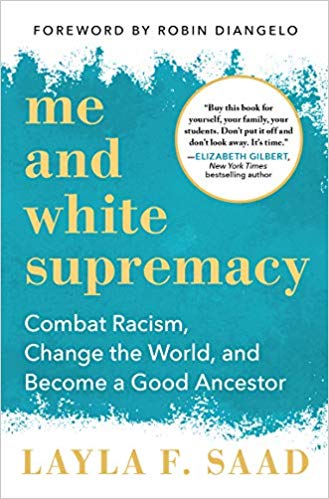In The Critic, Ewa Dymek and Mateusz Dymek review Me and White Supremacy: How to Recognize your Privilege, Combat Racism and Change the World by Layla F. Saad (the North American release is subtitled “Combat Racism, Change the World and Become a Good Ancestor”):
Conceptually, systemic racism is a fuzzy concept. It morphs from being defined as an institution with racist policies to one with no racist policies and no racist individuals but is nevertheless still racist. In certain circles to come out and ask for clarity on what systemic racism is, is to reveal your own deep lack of intellectual sophistication: because nowadays everyone knows what it is – it’s this BIG thing. How big? What follows is quite a lot wide, circular arm movements illustrating that systemic racism is BIG and EVERYWHERE. And exactly where everywhere, is followed by eye rolling. Then, inevitably, the words “unconscious bias” will accompany the definition, to which a genuine response might be: “But you don’t consider yourself a racist, do you?” And silence will follow. It wasn’t a trick question but any answer in this particular milieu is tricky. To say out loud: “Yes, I am a racist” can obviously sound somewhat KKK. But to say the opposite could, according to the “creative visionary” Ms. Layla Saad, mean that “you have been conditioned into a white supremacist ideology, whether you have realized it or not.”
This, of course, is not an outlier view but in line with modern “Anti-racist” theories, such as Ibram X Kendi’s assertion that “the claim of ‘not racist’ neutrality is a mask for racism” or Robin DiAngelo’s insistence that a person declaring herself non-prejudice “only protects racism” (the author of White Fragility also penned the foreword to this book).
If these contradictions make perfect sense to you and wide, circular hand gestures are enough to explain the nuances of omnipresent racism, then you are primed for Ms. Saad’s acutely distressing self-help book Me and White Supremacy: Combat Racism, Change the World, and Become a Good Ancestor. Adapted from her 28-day Instagram challenge and drawn from childhood experiences of white supremacy in Wales and Swindon (before finishing up her schooling at a British private school in Qatar), the book is a heady mix of Mein Kampf meets The Secret. This bestseller takes the shape of an arduous course where each day you solemnly address the nuances of your deep hidden and latent racism towards the “BIPOCs” (Black, Indigenous, Persons of Colour). Daily written responses to journaling prompts are demanded of you (one would imagine in a jotter with a clenched black fist on its cover).
The core tenet of the Anti-Racist movement, as well as Ms. Saad’s curriculum, is to see the Western world through a racialist perspective, i.e. race and racism is always there to be found if you just put the hard work in. Ms. Saad explains: “I can count on one hand the number of times I experienced overt racism” but her teachings are not about that tangible, obvious type of racism, it’s about another type. The big and everywhere type. Through the Me and White Supremacy experience you will have to (if you’re white or “white-passing”) scrutinise every interaction with a person of a different skin colour for evidence of fetishisation, tokenism, colourism and “optical allyship” (helping a BIPOC just for show). Even as a bi-racial person, you will learn how each and every encounter with a BIPOC is probably an oppression and/or aggression that upholds your “internalised white privilege”. If the BIPOC in question happens to be your own child, you may find you are tokenising them too.




